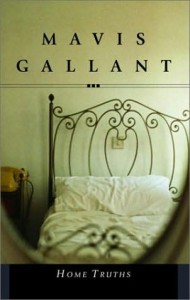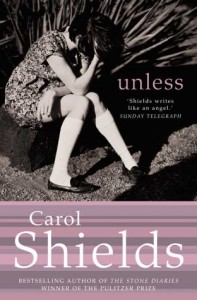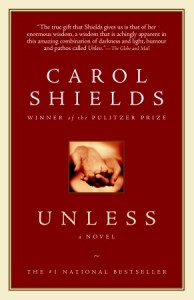February 6, 2011
Books in Motion #8
I usually watch readers on the subway from afar, taking note of appearances, accessories. I didn’t get a chance this time, because she was sitting right beside me on the Danforth Line and the first thing I noticed was that she was reading The Lacuna (by Barbara Kingsolver, who should have been on the cover of Time last year, remember? My best book of 2010?). Without even thinking, I said to her, “I love that book.” “I know,” she said, “isn’t it wonderful?” and I could hardly start staring then, taking notes on the cut of her trousers. She was reading it for her book club. I found the first 150 pages hard-going, I told her, but she said she was experiencing no such thing. I had to get off at the next stop, and by then we were friends, and wished her the best for the rest of her reading.
February 6, 2011
I am reading at the Draft Reading Series "Bloggers Live!" event
 It’s one week until I’ll be reading as part of the Draft Reading Series’ Bloggers Live! event, with my friends Julia Zarankin (of Birds and Words) and Maria Meindl (whose blog is brand new), and Diana Kiesners who writes The Accordian Diaries, which probably means there will be an accordian. Me, I’ll be sticking with prose, though anything is possible. In the spirit of whimsy, a convict riding a zebra.
It’s one week until I’ll be reading as part of the Draft Reading Series’ Bloggers Live! event, with my friends Julia Zarankin (of Birds and Words) and Maria Meindl (whose blog is brand new), and Diana Kiesners who writes The Accordian Diaries, which probably means there will be an accordian. Me, I’ll be sticking with prose, though anything is possible. In the spirit of whimsy, a convict riding a zebra.
The event is next Sunday, February 13th at 3pm at Merchants of Green Coffee (Queen and Broadview-ish).
Let me know if you’re coming, and I’ll save you a seat.
February 5, 2011
Canada Reads Independently 3: Home Truths by Mavis Gallant
 I may be crucified for admitting this, but I didn’t enjoy reading Mavis Gallant’s collection Home Truths, though the stories themselves, they’re a whole other thing. When I finished reading “The Ice Wagon Going Down the Street”, I had to close the book, catch my breath, and put my head back together. A story that hooked me with its opening lines, “Now that they’re out of world affairs and back where they started, Peter Frazier’s wife says, ‘Everybody else did well in the international thing except us.” The story is a scathing treatment of “the international thing” and the people who do it well or otherwise, a pathetic, tragic climax, ill-considered hobo costume, Saskatchewan evoked in the wilds of Geneva. What a trick to render the hollowness of life so very richly.
I may be crucified for admitting this, but I didn’t enjoy reading Mavis Gallant’s collection Home Truths, though the stories themselves, they’re a whole other thing. When I finished reading “The Ice Wagon Going Down the Street”, I had to close the book, catch my breath, and put my head back together. A story that hooked me with its opening lines, “Now that they’re out of world affairs and back where they started, Peter Frazier’s wife says, ‘Everybody else did well in the international thing except us.” The story is a scathing treatment of “the international thing” and the people who do it well or otherwise, a pathetic, tragic climax, ill-considered hobo costume, Saskatchewan evoked in the wilds of Geneva. What a trick to render the hollowness of life so very richly.
The collection opens with “Thank You for the Lovely Tea”, a perfect formula. Malicious girls in private school uniforms, and the coldest, most precise and shivery ending: “[Ruth] wondered if she would ever care enough about anyone to make all the mistakes those around her had made during the rainy-day tea with Mrs. Holland. She breathed on the window, idly drew a heart, smiled placidly, let it fade.” The book proceeds with characters caring enough to make all manner of mistakes– a young girl who rejects a playmate for her more sophisticated cousin; young girl abroad whose choice of lover lands her with inevitable heartbreak; Lottie Benz who goes to Europe, seeing the whole world as a pet project, but an acquaintance from home keeps her from making her neat arrangements, and forces her to reconsider the parameters of her life (which is another way of saying that she grows up).
In her pitch, Carrie Snyder referred to the collection as “a smorgasbord for the mind”, but I confess that it was just too much for me  to digest. The stories were so deep and involving that to move from one to the other was simply disorienting. (This is not a problem I usually have with short story collections. I love the idea of collections offering glimpses into window after window, and I am, after all, a veritable peeping tom.) These stories are exquisite, yes, but many are far from short, and they’re not ideally presented together in book form. Though the edition has given the book overall a definite structure (“At Home”, “Canadians Abroad” and “Linnet Muir”), these stories are not necessarily enhanced by being considered together.
to digest. The stories were so deep and involving that to move from one to the other was simply disorienting. (This is not a problem I usually have with short story collections. I love the idea of collections offering glimpses into window after window, and I am, after all, a veritable peeping tom.) These stories are exquisite, yes, but many are far from short, and they’re not ideally presented together in book form. Though the edition has given the book overall a definite structure (“At Home”, “Canadians Abroad” and “Linnet Muir”), these stories are not necessarily enhanced by being considered together.
I take full responsibility for this as a reader. For not having the kind of time to consider each of these stories singularly, as they’re intended to be. But perhaps these stories are best considered within the context of whatever issue of The New Yorker each one first appeared in, which places for them, I think, fully at home in the wide literary world. We’re also really talking novels for Canada Reads Independently, and though I might argue that any one of these stories on its own conveys as much depth as a novel, if not more, the effect of all of them together is overwhelming to compare book-for-book.
Now, Carrie Snyder notes that she chose this book primarily for its Linnet Muir stories, however, Muir being the narrator and protagonist of the final third of stories in Home Truths and to consider these, I’d like to shift gears a little bit. Linked short stories have a bad rap these days, a cheap way for publishers to sell a novel that isn’t (for writers to write one). But I would argue that the best collections of linked stories possess a range of perspectives not possible in other forms, and a greater chance of coming close to presenting something like truth.
This is apparent in the Linnet Muir stories, which present the same characters and events in different contexts. And interestingly, because they weren’t necessarily intended to be published together, contain a great deal of repetition in order to establish the facts of Linnet’s life, repetition that would be edited out of a novel’s first draft, but which becomes almost a meditation here. Characters who are secondary in one story are in the spotlight in the next. There is flux, there are many plots, some fizzle out and go nowhere, characters grow up and change their minds, and this is kind of what life is.
“Between Zero and One” was my favourite story in this section, Linnet Muir considering the world of men which she becomes privy to as the sole female working in a Montreal office during World War 2, and how other women could be just as complicit as men in ensuring women’s place as a “third-class immigrant”. In many of the stories, she’s reflecting on her parents, who were too young and too consumed in their own affairs to be present to her as a child, and who are both lost to her now. Linnet is coming of age as she looks back on the vanished world of her childhood, vanished doubly for having disappeared at the beginning of September 1939. Wartime is the backdrop of “Varieties of Exile”, which (like many of these stories) talked around and around itself, avoiding the epicentre to the point where I began to question its architecture, but came to a sad and illuminating conclusion that gave me the strange feeling that this story’s destination and not the journey was necessarily the point (though the latter will be entirely worthwhile upon rereading).
These stories are difficult, and I might suggest that “precise” is an adjective that rarely applies. Not that these stories aren’t deliberately constructed, the imprecision itself deliberate somehow, but there is a muddledness to the prose– lines that could mean any number of things. “I did not forget her, but I forgot about her” says Linnet about the godmother who fails to follow through, and though the line rings familiar, sparkles with insight, what she means exactly is unclear. Which triples the stories’ already-expansiveness.
I’ve also failed to really get to the point, because there are too many points to be considered. Instead of glimpses into one window after another, I kept getting lost in mansions. And so although Gallant should top any list, I can’t put her at the top of this one, but then Home Truths is really a book that belongs in a class of its own.
Canada Reads Independently Rankings:
1) Truth and Bright Water by Thomas King
2) Home Truths by Mavis Gallant
3) Be Good by Stacey May Fowles
February 3, 2011
Mastering subtlety
“Bookish people, who are often maladroit people, persist in thinking they can master any subtlety so long as it’s been shaped into acceptable expository prose.” — from Unless by Carol Shields
February 2, 2011
Slow snow falling deep
 My life at the moment offers such a richness of time, for which I am incredibly grateful. We are very rarely in a hurry, Harriet can walk down the street at her own stumbling pace, we can do the grocery shopping in the morning when the store is nearly empty, we get chores out of the way in the week so that weekends are devoted to pleasure, and when I call to make her doctor’s appointment, I’m able to say that pretty much any time is fine. (Except nap-time. Nap-time is sacred. There is never enough time in nap-time, or in the evenings after Harriet goes to bed, and I take care to use every second of this precious free time for writing and reading, and I do. When I’m not looking at photos of people I don’t know on Facebook.)
My life at the moment offers such a richness of time, for which I am incredibly grateful. We are very rarely in a hurry, Harriet can walk down the street at her own stumbling pace, we can do the grocery shopping in the morning when the store is nearly empty, we get chores out of the way in the week so that weekends are devoted to pleasure, and when I call to make her doctor’s appointment, I’m able to say that pretty much any time is fine. (Except nap-time. Nap-time is sacred. There is never enough time in nap-time, or in the evenings after Harriet goes to bed, and I take care to use every second of this precious free time for writing and reading, and I do. When I’m not looking at photos of people I don’t know on Facebook.)
The best thing about this arrangement is that we can take pleasure in the little things, that there is no such thing as drudgery, because everything has its place. For instance, I clean the house on Friday mornings and don’t worry about my filthy kitchen floor for the rest of the week, and I have somehow come to love this ritual, that I’m not cleaning while I could be doing something better, but that I’m cleaning because it’s what we do then. And when we finish, there will be time for something else. So that I can enjoy the seven seconds in which the sun gleams from my just-mopped floor, and the stove-top is scrubbed (and I just don’t look in the bathtub, which is never, ever scrubbed). To clean my house is satisfying, and to be finished even more so.
I have also become a passionate snow shoveller. Snow shovelling is only such a chore, because it creeps up on you just when you’re late for work, but this is never the case with us. The storm that struck our city last night was not as powerful as predicted, but still, a man skiied by my house this morning, and snow had covered everything. And because Harriet and I were expecting a friend this morning, we went outside to shovel her way up to our door. (We shovel also for the postal service. If you clear it, they will come.) Harriet has a small shovel, and is impressed enough by it and by the snow that she is satisfied to watch me work. And it was the perfect snow to shovel to– there was so much of it, but it was light enough that I could lift big shovel-fulls of it, feel impressive, and not injure my back.
I get so so few opportunities to actually physically labour (which is a good thing. I once did a Habitat for Humanity Build, almost killed myself, and spent most of the build under a tent eating twinkies, and no one minded, because I was very bad at building houses). Which makes it entirely satisfying to work for once, to use my body, my strength, to clear the sidewalks and our driveway, creating mountains at the edges that are taller than Harriet. (A mountain taller than Harriet. I know. Can you imagine such immensity?). To know that snow-clearing is by-lawed as my obligation as a citizen of this city, that we have to work together to keep our sidewalks clear, and how many people fulfil their duty actually as opposed to those who don’t. It makes me hopeful. And to be out there in the fresh-snowed quiet of a Wednesday morning, everybody either gone to work or snow-dayed in bed, the snow still falling and me quite content knowing that I’m doing a job that will never be done.
February 1, 2011
Canada Reads 2011: Unless by Carol Shields
I was thrilled when Carol Shields’ novel Unless made the cut for Canada Reads 2011, but also disheartened, anticipating how inappropriate a forum Canada Reads is for a novel as complex as this one. Anticipating also how easily this novel could be glossed over, dismissed in the name of Survivor-style competition. I passionately hope the debates will turn out to be otherwise, and to do my part towards this end, I wanted to add my own voice to the conversation. So this past weekend, I re-read Unless for perhaps the seventh or eighth time since I read it first in 2003. (April 20th, 2003, according to my note on the inside cover. Which points out also that I was residing on Silverdale Road in Nottingham at the time, the reason for my UK edition.)
I cannot remember what it was to first encounter Unless. I only know that I’ve reread it annually for at least the last five years, and that each time has added a whole new level of understanding to my reading experience. (Oddly, I’d normally say that re-reading a book “uncovers” meaning, but it feels different with Unless, as though the reading experiences were more cumulative. Though I suppose each uncovering is an addition as well, but a subtraction of went before is implied [detritus tossed into a pile] and that isn’t what I mean here).
I can tell what I’ve zeroed in on in previous readings, based upon the marginalia of past selves: that the novel is a tongue-in-cheek primer on how to write a Carol Shields novel (self-referential to the point where her protagonist’s novel begins, “Alicia was not as happy as she deserved to be” vs. the first sentence(s) of Shields’ first novel, which is, “Sunday night. And the thought strikes me that I ought to be happier than I am.”) and in fact, a very useful resource in that respect. I’ve noted the novel’s fragmented structure, and that one chapter was previously published as a short story. I’ve noted its themes of motherhood and female friendship, and the steadfast relationship between Reta Winters and her husband Tom, who had sex on the night they met. That at some point Reta remarks about annoyingly obtuse novels with stupid tricks like a chair in every chapter, but that there is (very nearly?) a chair in every chapter here, very specific chairs, all situated around the idea of the sitting woman. That I still don’t understand how the chapter titles relate to the chapters in question, or what the little words (words I use all the time) in fact mean, and I could think on them forever. I noticed lines about a woman’s place, about Women’s place– Mrs. as diminutive, about wanting and not having, about rage and stamping that lady-sized foot, and an exclusion from greatness. And I can identify with Norah’s overwhelming sense of being lost in the world: “And language. Well, you know. And branches of languages and dead languages and forgotten dead languages.” The sheer ungraspability of all of it.
It’s not difficult to imagine the criticisms that will be launched against Unless in the Canada Reads debates. (I say all this very hopefully. That fate will conspire to prove me wrong and that this book, no doubt the most interesting and definitely most essential of the lot, will prove to be the dark horse of the race. Fingers crossed. There’s even a man championing it, so the odds are better than they would have been.) Its plotlessness. The weakness of the main storyline, which is apparent to me at times (and I do get bogged down in the geographical details of Bloor and Bathurst, that if Norah is on the corner, than she cannot be near the subway entrance, which is further up the street and safely housed in Bathurst station, but anyway…).
That Reta Winters has a chip on her shoulder, so said a commenter on the CBC online forum a while back. Readers will complain that they could barely get through it (to which I will want to respond with a hardcover book to the head, because such a failure is your problem, not the book’s! Read better.) Someone will call this a woman’s novel (and forgive me, more parenthesis, but although I do believe that there are such things as woman’s novels, I don’t think the label is a good enough reason for a man not to bother to read one).
The complexity of the novel became especially clear to me a reading or two ago, that although this is a feminist novel and Reta’s feminist ideas were feeding something within me, that the novel’s solution is not so simple. This time around, I underlined a part about Reta’s projection of her own experience– onto her daughter, her friends, her mother-in-law, the woman who lived in her house the sixties. The important thing to understand when reading Unless and finding Reta Winters somewhat tedious is that Shields has her protagonist turn out to be wrong– what a brave thing for a novelist to do. Reta’s daughter has not taken to the streets because she has been excluded from greatness, the woman who lived in her house was not a matronly housewife called Lillian but a university grad called Crystal, Reta’s mother-in-law is not suffering from much more than loneliness and some of this is Reta’s own doing.
Part of the problem with Reta, and with women, is of their own making. We see this in the conversations Reta has with her friends in which they’re eternally interrupting one another and therefore always just missing the point. In which Reta would sooner make up narratives than probe the ones in her own life. In which too many conclusions are being jumped to, not enough questions being asked. Even simple questions, like, “Tell me all about yourself, Lois.” We’re too busy talking and not doing enough listening, so that we’re missing obvious things. The big ideas are getting away from us.
And yet. Reta Winters wasn’t all wrong. That women appear to excluded from greatness was not the cause of her daughter’s breakdown, but it doesn’t change the fact that women are. The bean-counting, as Reta goes through magazine contributers’ lists and noticing glaring disparity. When she cites literary conversations in which nary a woman is mentioned, as though a woman has never written a book (“Now the nineteenth century. There were some interesting women writers then”). Books like The Ingenuity Gap (which has a cameo in Unless) and Outliers, which restructure the universe so not to include women all. Oh, how the three boys in my graduate English courses always owned the conversation, how a book like Moore’s February is dismissed as “teary hormonal paste, how The Walrus is a lad’s mag, but we have to pretend it’s general interest.
Reta is “partly-right and partly-wrong”, as was her husband Tom who’d theorized that their daughter was suffering from post-traumatic stress syndrome. Such doubleness being the revelation of Unless, that the world is so complex that two things can exist at once, and in fact, as Reta says earlier on in the book, “doubleness clarifie[s] the world.” That we are not so simple as us vs. them, men vs. the feminists. That instead of “versus”, we have words like unless, nevertheless, next, hence, so etc. Words not to set up binaries, but to connect ideas in an intricate fashion.
This time around, I also noticed Reta’s point that what she’s writing isn’t written on her word processor, but on her consciousness, and how this explains the structure of the book. How I continue to see each chapter as a meditation, Reta revisiting her situation, attempting to get close to the heart of the matter, but missing that elusive something every time (and sometimes most deliberately). I noticed the palpability of her sadness her in a way I don’t remember doing so before, the explosion of, “My heart is broken”. The book’s conflation of book narrative and life narrative– I love this. I thought about “Goodness” in opposition to “God” instead of “Greatness”, the polite curse of ladies, and what that might mean.
See, I dare you to talk about this book articulately in the space of three hour-long debates. I don’t know if it’s even possible, or if I’ll even be able to bear listening and what might be said against this book I hold so close to my heart. But I also dare you to find a book in the line-up with anywhere near the same richness, and I have a feeling you’d only come up short. So that if Unless can’t win Canada Reads 2011, then I’m not sure that any other book should.







